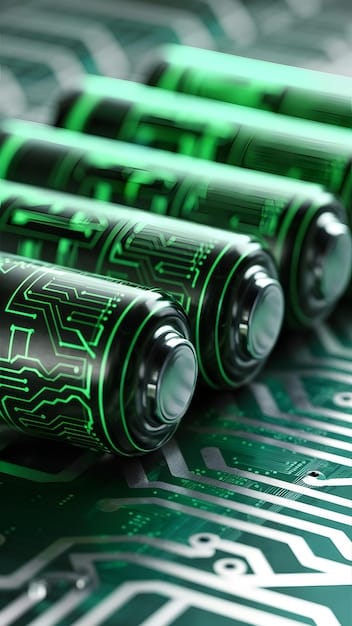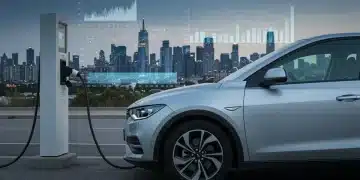Used Electric Vehicle Market Growth in the US: Key Factors

The growth of the used electric vehicle (EV) market in the US is primarily driven by factors such as increasing affordability due to depreciation, growing environmental awareness, government incentives, improved battery technology, and a wider variety of available models.
The used electric vehicle (EV) market in the US is experiencing significant growth, presenting both opportunities and challenges for consumers and the automotive industry. Understanding what are the key factors driving the growth of the used electric vehicle market in the US is crucial for navigating this evolving landscape.
Increasing Affordability of Used EVs
One of the primary drivers behind the surge in the used EV market is the increasing affordability of these vehicles. As EVs depreciate, they become more accessible to a wider range of consumers who may have been priced out of the new EV market.
Depreciation Impact on Affordability
The rate of depreciation for EVs can be quite significant, especially in the first few years of ownership. This depreciation makes used EVs an attractive option for budget-conscious buyers.
Comparing Costs: New vs. Used EVs
The price difference between a new EV and a comparable used model can be substantial, making the used market a compelling alternative for many consumers looking to switch to electric.
- Lower Initial Cost: Used EVs offer a lower initial purchase price compared to new models.
- Reduced Financing: Lower prices translate to reduced financing costs.
- Insurance Savings: Insurance premiums may be lower for used EVs due to their reduced value.
The increasing affordability of used EVs is a major catalyst for market growth. As more consumers realize the potential cost savings, demand for used electric vehicles continues to rise, making them a practical choice for environmentally conscious buyers.
Government Incentives and Regulations
Government incentives and regulations play a crucial role in driving the growth of the used EV market. These policies are designed to encourage the adoption of electric vehicles, both new and used.
Federal Tax Credits for Used EVs
The federal government offers tax credits for the purchase of used EVs, making them more affordable and attractive to consumers. These incentives can significantly reduce the overall cost of ownership.
State and Local Incentives
In addition to federal incentives, many state and local governments offer their own rebates, tax credits, and other incentives for purchasing used EVs. These local initiatives further boost the market.

- Rebates on Purchase: Direct rebates can lower the upfront cost of a used EV.
- Tax Credits: State tax credits can provide additional savings.
- HOV Lane Access: Some states offer access to high-occupancy vehicle lanes for EV owners.
Government incentives and regulations are vital for promoting the adoption of used EVs. By lowering the financial barriers and increasing the benefits of EV ownership, these policies contribute significantly to the growth of the market.
Growing Environmental Awareness
Increasing environmental awareness is a significant factor driving the growth of the used EV market. Consumers are becoming more conscious of the environmental impact of their transportation choices.
Reducing Carbon Footprint with EVs
Electric vehicles produce zero tailpipe emissions, making them a cleaner alternative to gasoline-powered cars. Used EVs provide an accessible way for consumers to reduce their carbon footprint.
Consumer Demand for Sustainable Options
As environmental concerns grow, more consumers are actively seeking sustainable and eco-friendly transportation options. Used EVs offer a cost-effective way to meet this demand.
The shift towards sustainable transportation is undeniable, and used EVs play a crucial role in this transition. As more consumers prioritize environmental responsibility, the demand for used electric vehicles will continue to grow, contributing to a cleaner and more sustainable future.
Advancements in Battery Technology
Advancements in battery technology have a direct impact on the used EV market. Improved battery performance and longevity make used EVs a more reliable and attractive option for consumers.
Increased Range and Longevity
Newer EV models boast increased battery range and longer lifespans. As these vehicles enter the used market, they offer a more appealing proposition for potential buyers.
Battery Health and Replacement Costs
Concerns about battery health and replacement costs are common among used EV buyers. However, advancements in battery technology are alleviating these concerns by improving battery durability and reducing replacement expenses.

- Improved Energy Density: Batteries now offer longer ranges on a single charge.
- Extended Lifespan: Modern batteries are designed to last longer.
- Reduced Degradation: Battery degradation rates have significantly decreased.
The progress in battery technology is a game-changer for the used EV market. As batteries become more reliable and offer better performance, consumers gain confidence in purchasing used electric vehicles, driving market growth and accelerating the transition to electric mobility.
Availability of a Wider Range of Models
The increasing availability of a wider range of used EV models is a key factor in the market’s expansion. As more EVs are sold new, a greater variety of options become available in the used market, catering to different consumer needs and preferences.
Variety in Body Styles and Features
The used EV market now offers a diverse selection of body styles, including sedans, SUVs, and hatchbacks, along with a variety of features and trim levels.
Increased Supply of Used EVs
As the initial wave of EV adopters trade in their vehicles for newer models, the supply of used EVs continues to grow, providing consumers with more choices and competitive pricing.
The broader range of models available in the used EV market makes it easier for consumers to find a vehicle that meets their specific requirements and budget. This increased variety and supply contribute to the overall growth and appeal of the used EV market.
Infrastructure Development and Charging Accessibility
The expansion of charging infrastructure and improved charging accessibility are essential for the continued growth of the used EV market. Consumers need convenient and reliable charging options to confidently purchase and use electric vehicles.
Public Charging Stations
The number of public charging stations is rapidly increasing across the US, making it easier for EV owners to charge their vehicles while on the go.
Home Charging Solutions
Many EV owners install home charging units, providing a convenient and cost-effective way to charge their vehicles overnight. The availability of home charging solutions is a significant factor for potential used EV buyers.
Improved charging infrastructure and accessibility are critical for addressing range anxiety and encouraging the adoption of used EVs. As charging options become more readily available, more consumers will be willing to consider purchasing used electric vehicles, further driving market growth and paving the way for a sustainable transportation future.
| Key Factor | Brief Description |
|---|---|
| 💰 Affordability | Used EVs depreciate, becoming cheaper than new models. |
| ✅ Incentives | Government tax credits and rebates lower the cost. |
| 🌱 Eco-Friendly | Consumers want sustainable transport options. |
| 🔋 Battery Tech | Batteries last longer and perform better. |
FAQ
▼
Used EVs are more affordable due to depreciation. As they age, their price decreases, making them accessible to budget-conscious buyers who can’t afford new EVs.
▼
Government incentives like tax credits and rebates lower the overall cost of buying a used EV. This encourages more people to switch to electric vehicles, boosting market growth.
▼
As people become more aware of their carbon footprint, they seek sustainable options like EVs. Opting for a used EV allows them to reduce emissions without the high cost of a new one.
▼
Battery technology advancements have increased range and lifespan. This makes used EVs more reliable and appealing, as buyers worry less about battery health and replacement costs.
▼
More public stations and home solutions ease range anxiety. This makes it more convenient for people to own and use EVs, removing a major barrier to entry for potential buyers.
Conclusion
The used EV market in the US is propelled by increasing affordability, government incentives, growing environmental awareness, better battery tech, wider model availability, and improved charging. These elements combine to create a compelling case for consumers looking to switch to electric vehicles, making the used EV market poised for continued expansion.





